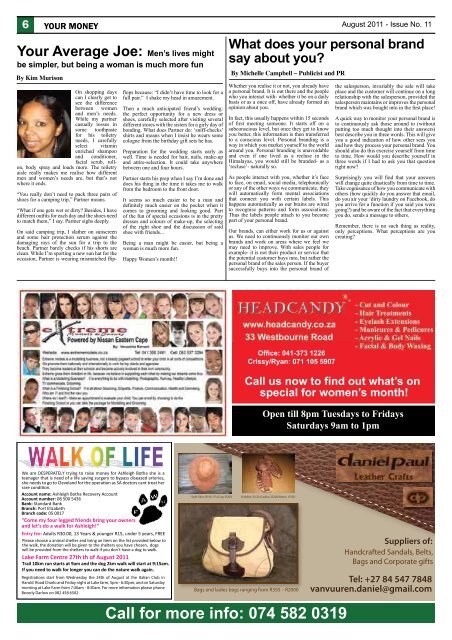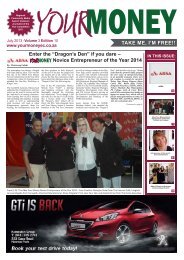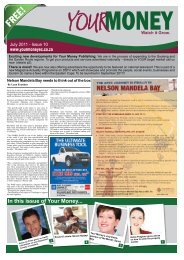Issue 11 - August 2011 - Your Money
Issue 11 - August 2011 - Your Money
Issue 11 - August 2011 - Your Money
You also want an ePaper? Increase the reach of your titles
YUMPU automatically turns print PDFs into web optimized ePapers that Google loves.
6 YOUR MONEY<br />
<strong>Your</strong> Average Joe: Men’s lives might<br />
be simpler, but being a woman is much more fun<br />
By Kim Murison<br />
On shopping days<br />
can I clearly get to<br />
see the difference<br />
between women<br />
and men’s needs.<br />
While my partner<br />
casually tosses in<br />
some toothpaste<br />
for his toiletry<br />
needs, I carefully<br />
select vitamin<br />
enriched shampoo<br />
and conditioner,<br />
facial scrub, rollon,<br />
body spray and loads more. The toiletry<br />
aisle really makes me realise how different<br />
men and women’s needs are, but that’s not<br />
where it ends.<br />
“You really don’t need to pack three pairs of<br />
shoes for a camping trip,” Partner moans.<br />
“What if one gets wet or dirty? Besides, I have<br />
different outfits for each day and the shoes need<br />
to match them,” I say. Partner sighs deeply.<br />
On said camping trip, I slather on sunscreen<br />
and some hair protection serum against the<br />
damaging rays of the sun for a trip to the<br />
beach. Partner barely checks if his shorts are<br />
clean. While I’m sporting a new sun hat for the<br />
occasion, Partner is wearing mismatched flip-<br />
flops because: “I didn’t have time to look for a<br />
full pair.” I shake my head in amazement.<br />
Then a much anticipated friend’s wedding:<br />
the perfect opportunity for a new dress or<br />
shoes, carefully selected after visiting several<br />
different stores with the sisters for a girly day of<br />
bonding. What does Partner do: ‘sniff-checks’<br />
shirts and moans when I insist he wears some<br />
cologne from the birthday gift sets he has.<br />
Preparation for the wedding starts early as<br />
well. Time is needed for hair, nails, make-up<br />
and attire-selection. It could take anywhere<br />
between one and four hours.<br />
Partner starts his prep when I say I’m done and<br />
does his thing in the time it takes me to walk<br />
from the bedroom to the front door.<br />
It seems so much easier to be a man and<br />
definitely much easier on the pocket when it<br />
comes to grooming and looking good. Part<br />
of the fun of special occasions is in the pretty<br />
dresses and colours of make-up, the selecting<br />
of the right shoe and the discussion of said<br />
shoe with friends...<br />
Being a man might be easier, but being a<br />
woman is much more fun.<br />
Happy Women’s month!!<br />
What does your personal brand<br />
say about you?<br />
By Michelle Campbell – Publicist and PR<br />
Whether you realise it or not, you already have<br />
a personal brand. It is out there and the people<br />
who you interact with- whether it be on a daily<br />
basis or as a once off, have already formed an<br />
opinion about you.<br />
In fact, this usually happens within 15 seconds<br />
of first meeting someone. It starts off on a<br />
subconscious level, but once they get to know<br />
you better, this information is then transferred<br />
to a conscious level. Personal branding is a<br />
way in which you market yourself to the world<br />
around you. Personal branding is unavoidable<br />
and even if one lived as a recluse in the<br />
Himalayas, you would still be branded- as a<br />
‘recluse’- naturally so.<br />
As people interact with you, whether it’s face<br />
to face, on email, social media, telephonically<br />
or any of the other ways we communicate, they<br />
will automatically form mental associations<br />
that connect you with certain labels. This<br />
happens automatically as our brains are wired<br />
to recognise patterns and form associations.<br />
Thus the labels people attach to you become<br />
part of your personal brand.<br />
Our brands, can either work for us or against<br />
us. We need to continuously monitor our own<br />
brands and work on areas where we feel we<br />
may need to improve. With sales people for<br />
example- it is not their product or service that<br />
the potential customer buys into, but rather the<br />
personal brand of the sales person. If the buyer<br />
successfully buys into the personal brand of<br />
<strong>August</strong> 20<strong>11</strong> - <strong>Issue</strong> No. <strong>11</strong> <strong>August</strong> 20<strong>11</strong> - <strong>Issue</strong> No. <strong>11</strong><br />
the salesperson, invariably the sale will take<br />
place and the customer will continue on a long<br />
relationship with the salesperson, provided the<br />
salesperson maintains or improves the personal<br />
brand which was bought into in the first place!<br />
A quick way to monitor your personal brand is<br />
to continuously ask those around to (without<br />
putting too much thought into their answers)<br />
best describe you in three words. This will give<br />
you a good indication of how other sees you<br />
and how they process your personal brand. You<br />
should also do this exercise yourself from time<br />
to time. How would you describe yourself in<br />
three words if I had to ask you that question<br />
right now?<br />
Surprisingly you will find that your answers<br />
will change quite drastically from time to time.<br />
Take cognisance of how you communicate with<br />
others (how quickly do you answer that email,<br />
do you air your ‘dirty laundry on Facebook, do<br />
you arrive for a function if you said you were<br />
going?) and be aware of the fact that everything<br />
you do, sends a message to others.<br />
Remember, there is no such thing as reality,<br />
only perceptions. What perceptions are you<br />
creating?<br />
Avoid Emotional Homebuying<br />
By Kobie Potgieter, Owner of Remax Independant<br />
Every year,<br />
thousands of<br />
people enter the<br />
home market or<br />
others decide<br />
it’s time to<br />
relocate and<br />
buy a new<br />
home. This can<br />
be one of the<br />
most exciting<br />
times in one’s<br />
life, full of<br />
new beginnings -- as long as you buy the right<br />
house for you.<br />
Often, however, our emotions cloud our better<br />
judgment and this can lead us into buying a<br />
home that’s simply not right for us.<br />
No matter how much money you have most of<br />
us get emotionally involved with our decision<br />
to buy or sell a home. There are many reasons<br />
for this. Firstly for many of us it is the largest<br />
purchase we will make and because of this it<br />
can be tied to our ongoing financial security.<br />
It is also the place you live, so even if it is not<br />
one of your biggest assets, making the right<br />
decision can dramatically impact your life.<br />
Perhaps the biggest risk emotionally is<br />
falling in love with the wrong home. Maybe<br />
you fell in love with the fabulous backyard,<br />
and overlooked the fact that there’s only one<br />
bathroom for your growing household. Or<br />
it could be the expanded family room that<br />
caught your attention -- even though the house<br />
is located on a very busy street. After all even<br />
“Buckingham Palace” is on a main road.<br />
When you get too emotionally involved in this<br />
decision you can often make critical mistakes<br />
that you may regret for a lifetime. It also can<br />
dramatically impact your quality of life and the<br />
lives of those you care most about.<br />
It’s also easy to jump into the wrong home if<br />
you’re relocating to a sought-after area and are<br />
afraid that you won’t find another home close<br />
by. And if you begin to equate a home with<br />
your happiness -- imagining the “perfect” life<br />
that the breakfast nook and bedroom fireplace<br />
will create -- you’ve already lost control. As<br />
tempting as it may be to assume that all of your<br />
problems will disappear as soon as you get the<br />
keys to your flawless abode, we all know that it<br />
takes more than a house -- even a “perfect” one<br />
-- to make us happy. And in time, the novelty<br />
will wear off and you’ll suddenly see the things<br />
you couldn’t with your rose-colored glasses.<br />
Most mistakes when buying a new home are<br />
emotionally based. So how do you stay in the<br />
control when your emotions are going in a<br />
million different directions, from excitement<br />
to hope to anxiety?<br />
You need to take the emotional tug-of-war out<br />
of the decision and remember your priority list<br />
of Needs and Wants. You are then much more<br />
likely to make a decision that will satisfy you<br />
and your family in the long-term.<br />
Indeed, the best option is to approach homebuying<br />
with as much logic and savvy as you<br />
would any other major decision, and only<br />
when you have removed the emotions are you<br />
able to think clearly.<br />
Little Walmer Golf Estate- Early R4 000 000<br />
This grand, architecturally designed home is situated in the secure<br />
and Upmarket Little Walmer Golf Estate. The front door opens into<br />
a spacious double volume reception room with marble stairs that lead<br />
up to the first floor. There are two bedrooms on the ground floor with<br />
the remaining rooms and living areas on the first floor (which opens<br />
directly onto the golf course).<br />
The living areas are open plan and flow seamlessly through to one<br />
another, with the sunroom and lounge both opening into the sunny<br />
garden, which leads onto the green of the first tee. There are no fences<br />
around any of the properties, creating a friendly and neighbourly<br />
environment. Air conditioners in all the bedrooms and the lounge<br />
ensure comfortable living conditions all year round.<br />
The home is fitted with an armed response alarm system and there is a<br />
security gate across the passage, allowing one to secure the first floor<br />
bedrooms at night. An automated irrigation system in the front and back<br />
feeds the garden and one has highly reduced membership fees for the<br />
Little Walmer Golf Club. There is an access controlled entrance to the<br />
estate with 24-hour guards and an electrified perimeter fence.<br />
4 Bedrooms (2 En Suite), 3 Bathrooms, Lounge, Dining Room, Kitchen<br />
with Scullery, Sun Room, Double Garage on Remote, Domestic/Guest<br />
Room with En Suite.<br />
Kobie Potgieter 082 771 2578<br />
Call for more info: 074 582 0319 Call for more info: 074 582 0319<br />
YOUR MONEY<br />
To BEE or not to BEE<br />
By Lynn Erasmus<br />
Having a black business partner is not<br />
neccassary to obtain a good B-BBEE<br />
scorecard. This is according to Yolandi van<br />
Tonder, B-BBEE verification Specilist from<br />
Emex Trust, a SANAS accredited B-BBEE<br />
verification agency.<br />
“There is a great misconception out there that<br />
you have to sell a portion of your company to<br />
obtain BEE status, this is not true. Companies<br />
who’s turnover is under R5 million per annual<br />
will be exempted and receive a level 4 B-BBEE<br />
status,” van Tonder said.<br />
Having B-BBEE status can improve business<br />
opportunities and even give you the edge over<br />
the competitor.<br />
As from December, the new Preferential<br />
Procurement Policy Framework Act (PPPFA)<br />
will be reconciled with B-BBEE, especially<br />
with regards to the tender processes.<br />
“The PPPFA states that you are awarded 10<br />
points for being a level 1 BEE contributor.<br />
If you were non-compliant you would get no<br />
points. In order to win the tender your prices<br />
need to be 10 points better than your competitor<br />
who may be level 1,” van Tonder explained.<br />
If the company’s turn-over is between R5<br />
million – R35 million per annum, then they will<br />
be classified as a Qualifying Small Enterprise<br />
(QSE). This will mean that any four of the<br />
seven elements can be chosen to be measured<br />
on. Here ownership can be excluded under one<br />
of the seven elements.<br />
7<br />
If the company’s turn-over is over R35 million<br />
per annum, they will be classified as a Generic<br />
Enterprise and will have to comply with all<br />
seven elements as seen below:<br />
• Ownership - black ownership /shareholding<br />
of the company.<br />
• Management and Control - Senior Top (e.g.<br />
CEO) or Other Top management.<br />
• Employment Equity – Black line management<br />
who are permanently employed.<br />
• Skills Development – Cost of training<br />
provided to your black employees.<br />
• Preferential Procurement – Goods or services<br />
purchased from an entity with a valid B-BBEE<br />
certificate issued within your measured<br />
financial year period.<br />
• Enterprise Development – Black owned<br />
(more than 50% black owned) entity that you<br />
have assisted for further development.<br />
• Socio-Economic Development –<br />
Contributions made towards your black<br />
employees, or the greater good of black<br />
beneficiaries.




